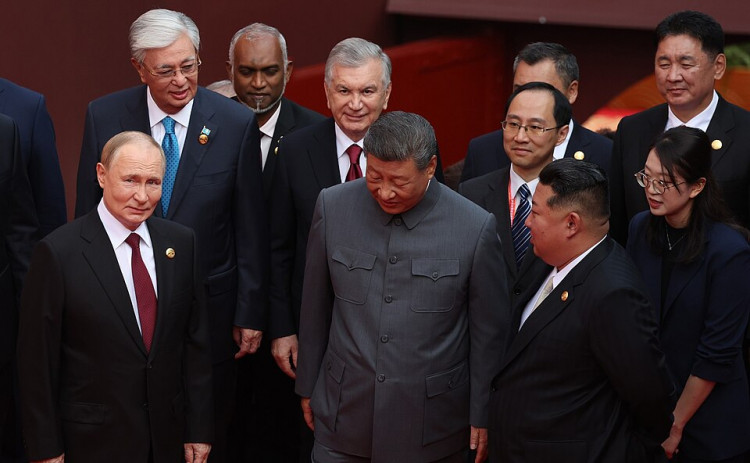Russian President Vladimir Putin and Chinese President Xi Jinping were overheard discussing organ transplants, life expectancy, and even immortality during an unguarded exchange on Wednesday, as they walked together ahead of a massive military parade in Beijing. The remarks, picked up by state media microphones, underscored the authoritarian leaders' shared interest in biotechnology and human longevity at a moment when both have consolidated power for the long term.
"Biotechnology is continuously developing," Putin said through a translator on live state television, as he and Xi walked across Tiananmen Square alongside North Korean leader Kim Jong Un. The interpreter added, "Human organs can be continuously transplanted. The longer you live, the younger you become, and [you can] even achieve immortality."
Xi, speaking in Mandarin, responded: "Some predict that in this century humans may live to 150 years old." He had earlier mused, "These days... 70 years old," prompting Putin to quote a Tang dynasty poem about the rarity of reaching old age in the past.
Putin later confirmed the exchange at a news conference. "Ah, I think it was when we were going to the parade that the chairman spoke about this," he told reporters, referring to Xi. "Modern means - both health improvement and medical means, and then even all kinds of surgical ones related to organ replacement - allow humanity to hope that active life will continue not as it does today."
The conversation took place as Xi hosted Putin, Kim, and other leaders from sanctioned states, including Iran's Masoud Pezeshkian and Belarus's Aleksander Lukashenko, for what Chinese state media called the country's largest-ever military parade. About 50,000 people gathered in Tiananmen Square to view displays of tanks, drones, nuclear-capable missiles, and stealth aircraft. Xi told the crowd that China stood firmly "on the right side of history" and was "never intimidated by any bullies," adding that the nation was "unstoppable."
The spectacle was widely interpreted as a challenge to the U.S.-led global order. Putin and Xi, both 72, have styled themselves as central figures in what Russian Foreign Minister Sergey Lavrov once called a move toward a "multipolar, just, democratic world order." Analysts in the West have dubbed the grouping of China, Russia, North Korea, and Iran an "Axis of Upheaval."
Neither Putin nor Xi has shown any intention of stepping aside. Xi abolished presidential term limits in 2018 and secured a third term in 2023. Putin, elected last year to a record fifth six-year term, has twice amended Russia's constitution to extend his grip on power and is already the Kremlin's longest-serving leader since Josef Stalin.
Longevity and the science of extending human life have long fascinated Russia's elite. In 2024, Putin ordered lawmakers to create a research hub called New Health Preservation Technologies to study "technologies that prevent cellular aging, neurotechnologies, and other innovations aimed at ensuring longevity." Independent outlet Meduza reported that Mikhail Kovalchuk, a confidant of Putin, has invested in organ-printing technology using lab-grown cells, while Putin's daughter, endocrinologist Maria Vorontsova, has received multimillion-dollar government grants for genetic research linked to anti-aging.
China, by contrast, has struggled with a chronic shortage of organ donors and a history of black-market trade. In 2016, World Health Organization officials convened in Beijing amid questions about whether Chinese hospitals had ended the practice of using organs from executed prisoners, as the government claimed.






